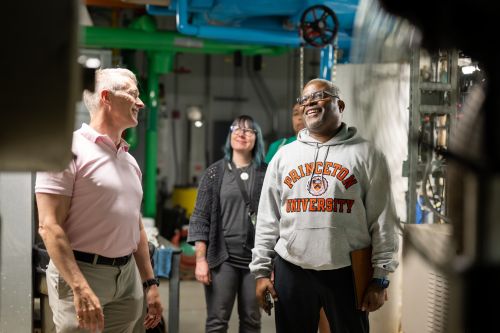
Curtis Hillegas (left), associate CIO of Research Computing, gave a tour of Princeton’s High-Performance Computing Research Center to formerly incarcerated students as part of a summer internship program in STEM research. Bridgett vonHoldt (center), an associate professor of ecology and evolutionary biology, directs the program; Claude McDougal (right) was one of this year’s four interns. Photos by Sameer A. Khan/Fotobuddy
By Molly Sharlach
August 24, 2023
Before his internship at Princeton University this summer, Wali Palmer knew lasers as highly focused beams of light. But his research experience at Princeton opened Palmer’s eyes to laser-based devices that could detect disease, perform surgeries and sense dangerous gases — and put him on a path toward designing them.
“That’s a whole next level of technology,” said Palmer, who will begin his second year at Rutgers University-Camden this fall.
Palmer, who is interested in computing and electrical engineering, took an unusual path to Princeton. He is one of four formerly incarcerated students who took part in this summer’s internship program introducing them to research in STEM fields. The four labs that hosted this year’s interns were led by engineering faculty, including Andrej Košmrlj, associate professor of mechanical and aerospace engineering, and Craig Arnold, Susan Dod Brown Professor of Mechanical and Aerospace Engineering.
Bridgett vonHoldt, an associate professor of ecology and evolutionary biology, directs the program, which is funded by the National Science Foundation. VonHoldt launched the internship as a virtual program in 2021, in partnership with the University’s Prison Teaching Initiative and the New Jersey Scholarship and Transformative Education in Prisons Consortium (NJ-STEP), which helps identify and support candidates for the program.
In Košmrlj’s mechanical and aerospace engineering research group, intern Ali Muslim worked with Ph.D. student Tejas Dethe on simulations to investigate the properties of phononic crystals — materials that can interact with sound in precise ways to produce desired acoustic effects.
Intern Claude McDougal took a different path, analyzing university research transfer processes and how they might be applied to a new technology from Arnold’s laboratory. Arnold, the Susan Dod Brown Professor of Mechanical and Aerospace Engineering and vice dean for innovation at Princeton, is leading the development of carbon-based aerogels for applications such as water purification and desalination.
McDougal, a student at the University of Nevada-Las Vegas who spent the summer at Princeton, said he was interested in learning about “the phases of moving that from research to something real in the marketplace. How do you go from a problem that needs to be solved, from research to an invention? And then, how do you protect that intellectual property?”
McDougal’s peer mentor, Ph.D. student Mohd Shaharyar Wani, said the project deepened his own knowledge of the patent process. He also made a point of introducing McDougal to the techniques used to characterize new materials. Bringing together this knowledge “broadens the thought process,” said Wani. “It helped him learn to put patent claims in a very precise manner to have more impact.”
The staff of the Prison Teaching Initiative (PTI) help recruit and support the program’s interns. PTI has brought higher education classes to prisons around New Jersey since 2006, and is a founding partner of the National Science Foundation’s STEM-OPS network, which advances STEM learning opportunities for people who are currently and formerly incarcerated.
The program builds on the success of Princeton’s efforts to expand opportunities for students from other institutions who might not otherwise have access to research as undergraduates. Jannette Carey, associate professor of chemistry, has run a summer research program in molecular biophysics since 2014, and approached vonHoldt with the idea of starting a program specifically for students who were formerly incarcerated.
“I often struggle with how to conduct effective outreach and science communication,” said vonHoldt, whose research uses genetics to understand the ecology, diversity and evolution and of wild and domesticated canines. “I do a lot of seminars and social media, but there are certain populations of students that we have done a disservice to. This, to me, was the most tangible way of reaching a population of students to give them the support that sometimes is really hard to come by.”
Along with research and technical training, the internship included career development and support from Dameon Stackhouse, an alumnus of the molecular biophysics summer program who is now a social worker for Somerset County, New Jersey.
Building relationships is a key part of the experience for students, said Stackhouse, who began earning his Rutgers degree while in prison. “Only individuals that have been through incarceration can fully understand the dynamics of pursuing your educational goals” in this context, with all the challenges and triumphs it entails, he said.
McDougal said that getting to know researchers and the community at Princeton has changed his outlook on the future.
“I didn’t see myself in the academic world. I didn’t really look at that as a possibility,” he said. “But now I see it as a possibility. Being around younger students keeps you young. It feeds your inner creativity.”